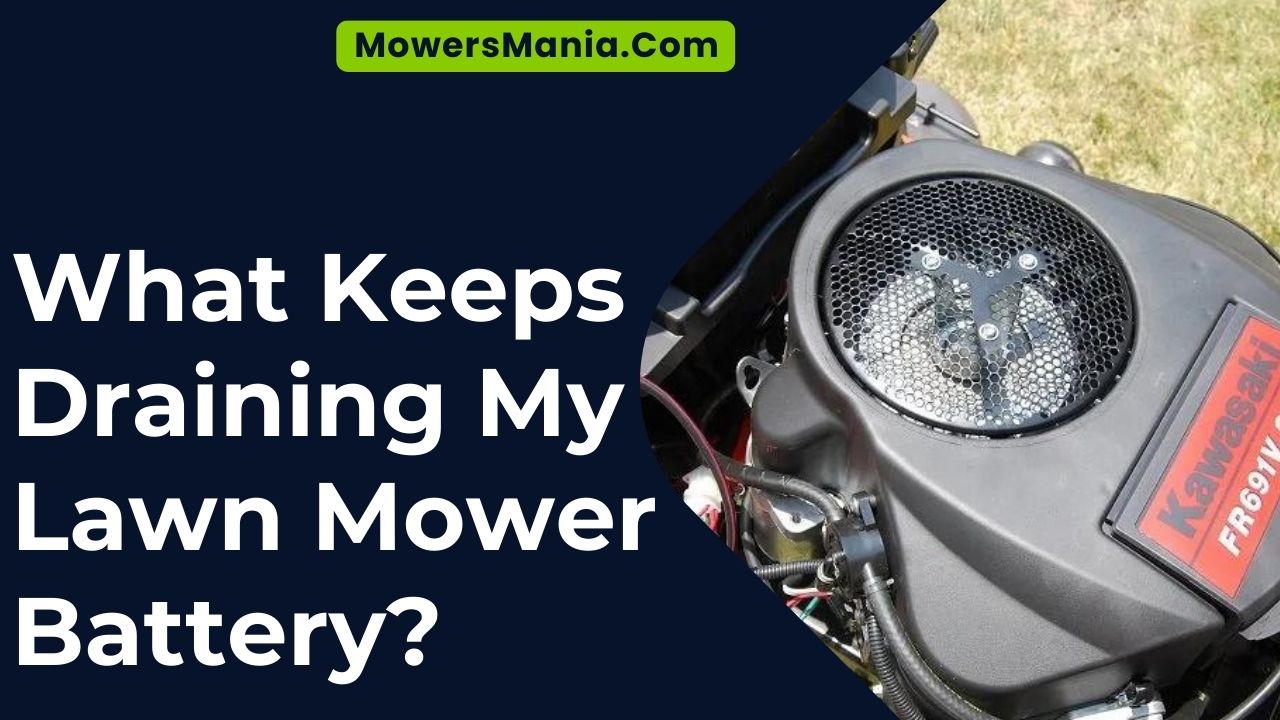Do you know that up to 80% of lawn mower battery problems are caused by preventable issues?
Understanding the factors that drain your lawn mower battery can save you time and money.

From improper charging habits to electrical system issues, there are several common culprits to consider.
By identifying the root cause, you can effectively address the problem and prolong the life of your battery.
Improper Charging Habits
If you find that your lawn mower battery keeps draining quickly, it may be due to improper charging habits. Overcharging the battery can significantly reduce its lifespan. Make sure to disconnect the charger as soon as the battery is fully charged.
Leaving it connected for extended periods can lead to overcharging, causing the battery to deteriorate faster.
Additionally, undercharging the battery frequently can also contribute to its rapid drainage. Ensure that you charge the battery fully after each use to maintain its health and longevity.
Another common mistake isn’t using the right type of charger for your lawn mower battery. Using a charger not specifically designed for your battery can result in improper charging, leading to reduced efficiency and a shorter lifespan. Always use the charger recommended by the manufacturer to ensure optimal performance.
Furthermore, storing the battery in extreme temperatures, whether hot or cold, can affect its ability to hold a charge. It’s essential to store the battery in a cool, dry place to maintain its performance.
Age and Condition of the Battery
To assess the age and condition of your lawn mower battery, conduct regular voltage tests using a multimeter. This will help you determine if the battery is holding a charge as it should or if it’s nearing the end of its lifespan.
Here are three key points to consider regarding the age and condition of your battery:
- Voltage Test Frequency: Regularly check the voltage of your lawn mower battery, especially after a period of inactivity or when you notice the battery struggling to start the mower. This will give you a good indication of its health and whether it’s holding a charge effectively.
- Expected Lifespan: Understand the typical lifespan of your specific lawn mower battery. Most batteries last around 3-4 years, but this can vary based on usage, maintenance, and environmental factors. If your battery is approaching this timeframe, it may be prudent to consider a replacement, especially if you’ve been experiencing issues.
- Visible Signs of Aging: Inspect the battery for any signs of corrosion, leakage, or physical damage. These can indicate that the battery is deteriorating and may need to be replaced soon.
Regular monitoring and assessment of your lawn mower battery’s age and condition can help you avoid unexpected issues and keep your mower running smoothly.
Electrical System Issues

If your lawn mower battery is draining quickly, it could be due to faulty wiring connections or an alternator that isn’t charging properly.
These electrical system issues can prevent the battery from maintaining a full charge, leading to frequent drainage.
Check for any loose or damaged wires and ensure that the alternator is functioning correctly to address these potential causes of battery drain.
Battery Draining Quickly
The electrical system issues causing your lawn mower battery to drain quickly can be frustrating to diagnose and resolve. It’s important to address these issues promptly to avoid further damage.
Here are a few common culprits:
- Faulty Charging System: A malfunctioning voltage regulator or alternator can lead to overcharging or undercharging the battery, causing it to drain quickly.
- Corroded or Loose Connections: Check for any corroded or loose wiring connections, as these can disrupt the flow of electricity and result in rapid battery drainage.
- Parasitic Drains: Certain electrical components or accessories may be drawing power from the battery even when the mower is turned off, leading to a quick drain. Identifying and addressing these parasitic drains is crucial in preserving the battery’s life.
Identifying and addressing these issues can help resolve the quick battery drainage problem.
Faulty Wiring Connections
Dealing with faulty wiring connections in your lawn mower’s electrical system can contribute to rapid battery drainage and disrupt the flow of electricity. Loose or corroded connections can lead to increased resistance, causing the battery to work harder and drain faster. Check the wiring harness, connectors, and terminals for any signs of damage or wear.
Ensure that all connections are tight, secure, and free from corrosion. Additionally, frayed or damaged wires can cause short circuits, leading to excessive battery drain. Inspect the wiring for any visible signs of wear and replace any damaged sections.
Proper maintenance of the electrical system, including regular inspection and cleaning of connections, can help prevent rapid battery drainage caused by faulty wiring connections.
Alternator Not Charging
To diagnose rapid battery drainage in your lawn mower, examine the alternator for potential issues with charging the electrical system. If the alternator isn’t charging properly, it can lead to continuous drainage of the battery, causing it to fail prematurely.
Here are three common reasons why your alternator may not be charging the battery:
- Faulty Voltage Regulator: A malfunctioning voltage regulator can cause the alternator to either overcharge or undercharge the battery, leading to drainage issues.
- Worn Out Brushes: Over time, the brushes inside the alternator can wear out, resulting in poor electrical contact and reduced charging capability.
- Broken Drive Belt: A broken or loose drive belt can prevent the alternator from functioning properly, leading to insufficient charging of the battery.
Inspecting these components can help identify and resolve alternator-related issues causing battery drainage in your lawn mower.
Excessive Engine Cranking
If you find yourself repeatedly cranking the engine for more than 10 seconds before it starts, it may be contributing to the drainage of your lawn mower battery. Excessive engine cranking places a heavy demand on the battery, draining it each time you attempt to start the mower. This overexertion can lead to a significant reduction in the battery’s lifespan and overall charge capacity.
When you crank the engine for an extended period, the battery has to work harder to provide the necessary power to start the mower. This strains the battery and can lead to a depletion of its charge, especially if the engine fails to start quickly. The longer the cranking time, the more strain it puts on the battery, which in turn contributes to its drainage.
To mitigate excessive engine cranking, ensure that your lawn mower is properly maintained. Regularly clean or replace the air filter, spark plug, and fuel filter as part of your mower’s maintenance routine. Additionally, using the choke properly and ensuring the fuel is fresh can help the engine start more efficiently, reducing the need for prolonged cranking.
Corrosion and Poor Connections

Make sure to regularly check for and clean off any corrosion on the battery terminals to maintain a strong electrical connection. Corrosion can build up on the battery terminals over time, leading to poor electrical contact and draining the battery.
Here are a few tips to help you deal with corrosion and poor connections on your lawn mower’s battery:
- Inspect the Terminals: Regularly inspect the battery terminals for any signs of corrosion. This includes looking for a white, powdery substance on the terminals, which indicates the presence of corrosion. Catching it early can help prevent more serious issues down the line.
- Clean the Terminals: If you spot any corrosion, it’s important to clean the terminals thoroughly. Use a mixture of baking soda and water to create a cleaning solution, then scrub the terminals with a wire brush. Rinse the terminals with water and dry them completely before reattaching the cables.
- Use Terminal Protectors: After cleaning the terminals, consider using a terminal protector spray or felt washers to help prevent future corrosion. These products can create a barrier between the terminals and the surrounding environment, reducing the likelihood of corrosion buildup.
Overuse of Accessories
Regularly using additional accessories, such as lights or a phone charger, can contribute to draining your lawn mower battery more quickly.
While these accessories can be convenient, they draw power from the battery, leading to faster drainage and potential issues starting your mower. It’s important to be mindful of how often and for how long you are using these accessories to avoid unnecessary strain on the battery.
To illustrate the power consumption of common lawn mower accessories, consider the following table:
| Accessory | Power Consumption |
|---|---|
| Lights | Moderate |
| Phone Charger | Low |
| Bluetooth Speaker | Moderate to High |
As shown in the table, certain accessories like lights and Bluetooth speakers can significantly drain the battery, especially if used for extended periods.
It’s essential to strike a balance between convenience and battery preservation. Consider using accessories sparingly and only when necessary to prolong the life of your lawn mower battery.
Frequently Asked Questions (FAQs)
Can Using a Battery Tender or Trickle Charger Help Improve the Lifespan of My Lawn Mower Battery?
Using a battery tender or trickle charger can definitely improve the lifespan of your lawn mower battery. These devices help maintain the battery’s charge and prevent it from draining, ultimately extending its overall longevity.
How Can I Tell if My Lawn Mower Battery Is Being Affected by Extreme Temperatures?
Extreme temperatures can affect your lawn mower battery. If it’s too hot, it can lead to fluid loss and plate corrosion. If it’s too cold, it can decrease the battery’s ability to hold a charge. Keep it in a moderate environment.
Are There Any Common Mistakes People Make When Jump Starting a Lawn Mower Battery?
When jump starting a lawn mower battery, avoid connecting the cables incorrectly, as it can damage the electrical system. Ensure the cables are securely connected and follow the correct order: positive to positive, then negative to a suitable ground.
What Are Some Signs That My Lawn Mower’s Electrical System May Be the Cause of Battery Drainage?
If your lawn mower’s electrical system causes battery drainage, signs include dimming lights, slow cranking, and erratic power. Check for loose or corroded connections, faulty wiring, or a malfunctioning charging system.
Is There a Way to Prevent Excessive Cranking of the Engine From Draining the Battery?
To prevent excessive cranking of the engine from draining the battery, make sure to maintain your lawn mower’s electrical system, including the starter and ignition. Also, keep the battery terminals clean and tight to ensure proper connection.
Conclusion
So, if you’re wondering what keeps draining your lawn mower battery, it could be due to:
- Improper charging habits
- The age and condition of the battery
- Electrical system issues
- Excessive engine cranking
- Corrosion and poor connections
- Overuse of accessories
Make sure to properly maintain and care for your lawn mower to avoid battery drainage issues in the future.



